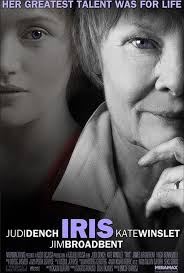My first reaction to to Iris: this movie is very, very British. Indeed, there's not a single thing about this biopic of controversial author Iris Murdoch that isn't stately: the performances are well-done, the visuals are gorgeous, and Richard Eyre's direction is grandiose without being sweeping, never daring to be stylistically separate from the conventional. Now, I'm not saying that this is necessarily a bad thing. I enjoyed the movie, and I think its certainly well-made. However, it does have its shortcomings, specifically the fact that half of the film is simply decent, while the other half is superior.



Let's talk about the simply-decent half first: the flashbacks to Iris in the 1950s, as played by Kate Winslet. Iris first meets her future husband, John Bayley (here played by Hugh Bonneville), but of course love is not immediate. Iris has a voracious sexual appetite, and though she's happy to have a relationship with the incredibly patient Bayley, she refuses to limit herself to only him. The problem is that this is never fully developed, but with a running time of only 91 minutes, how could it have been? What we get is a very glossed-over glimpse at the formative years of Iris, the ones that made her into such a controversial figure. And for a woman who's so sexually open, there's very little evidence here, apart from a single silhouetted glimpse at Iris with another man and a brief nude scene. Its a huge waste of such talented actors.
Winslet and Bonneville
The other half, on the other hand, is radically better: focusing instead on Iris toward the end of her life, played by Judi Dench, and her battle with Alzheimer's. She's still married to Bayley (a magnificent Jim Broadbent), who is himself starting to show signs of dementia, and her life has slowed down considerably. There's still no real explanation for why she was influential in British literature or society, and indeed this part of the film skims over her career as well. But it does present a fascinating glimpse at a couple grappling with memory loss, as Bayley is forced to take care of Iris, even though he may not even be able to take care of himself. Its a tragedy only elevated by the superb performances. Dench makes Iris's dementia devastating, filled with terror as she forgets where - and who - she is. And Broadbent's Bayley is the very definition of "supporting character," and he plays him with such gusto and instinctive knowledge that he can break your heart with just a single glance.
Broadbent and Dench
What Iris really needs is a longer running time. I very rarely say that about a film, but this one needs more room to develop and become a closer examination into what made Iris into such a polarizing figure. That being said, as is its a decent film, with a pair of masterful performances that can't be missed. Its certainly worth seeing just for Dench and Broadbent.
Comments